#anyway I bring this up because I am intending on reworking the old content to properly connect it with the current/shared stuff
Text
no one but me will care about this, but i looked thru my OG Android AU (before I started working on it with Mag) and the order of D10 units that got added is like:
Dio (Brando) -- DIO -- Dionysus -- Ramses -- Prototype #13 -- AuDio
And somehow I have neglected p much all of these, recently lmao
also hello, almost 53k words?
my smut doc is literally almost as long rn LOL
#delete later#EcciDiO was the last one *I* personally came up with I think - and even then Mag gave the inspo for his design#so I would argue that was more her than me hahaha#(all I did was make a shitpost about wrestling and somehow that escalated)#a couple of these I haven't posted about so... secret characters I guess xD#Dio (Brando) is the primary *android* of the bunch of DIO really got bumped up to like... borderline another main character too lolol#*but#i... don't know how I got 'of' out of 'but' but w/e#also that doesn't include *non* D10 characters either - there are still new ones getting added hahaha#masked guy was probably the newest? but Faust im still like... hyper attached to#MY MAGNUM OPUS and it turned out to be the (originally) shitpost character :')#anyway I bring this up because I am intending on reworking the old content to properly connect it with the current/shared stuff#am I biased? probably but I prefer the way Mag was going with the plot over whatever weird stuff I was trying to figure out#but the shared AU p much picks off where I left off on the solo one SO IT JUST WORKS OUT#(just with some details that need alteration)#i am very excited aaaaaaaaaa#also for the record the least-notable/important of the D10s in that list is AuDio#I DON'T think he's canon afaik but he spawned from a dumb idea I wrote ages ago#and Mag was like 'what if we made him come back and become relevant?'#and this is what AUs of AUs (of AUs) are for folks LOL
1 note
·
View note
Text
ASOIAF v/s GoT - Part 1: The Disdain for Vulnerable Heroes
Book to screen adaptations are tricky as it is. Adapting high fantasy is even trickier as visual artistry quite often takes precedence over plot and characterization. It’s difficult to adequately portray complex morality, hard decisions and internal agony. Characters are often simplified and pared down to only a few most visually arresting characteristics (mighty king/queen, unbeatable warrior, mysterious magic person, wise-cracking smartass etc etc etc). Plotlines are reworked to make them non-controversial, consequences are ignored and the more difficult subplots are simply done away with. Such actions are common across adaptations, and GoT is no exception.

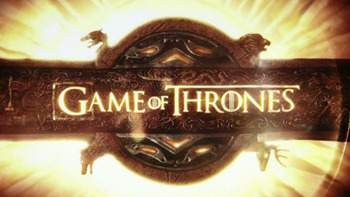
The distancing of the show from the books started becoming significantly observable S5 onwards. At a certain pivotal point, the obvious heroic characters began to get pigeon-holed - the noble (Jon), the badass (Arya) and the conqueror (Dany). Crucial characters like Tyrion and Bran also began to lose all trappings of individual motives to dedicate themselves to a ‘greater cause’. Characters canonically unreliable and/or unfavourable such as Jorah, Sansa and Varys get painted in a far more positive light than they deserve.
Of course, in Martin’s world the characters are far more layered and conflicted. And thus, to stick to the massively simplified (almost bastardized) show characterizations, D&D quite happily chunked off LARGE plot points essential to the main characters, in effect neutering everything that makes ASOIAF so fascinating to begin with.
Let’s first consider the two most obvious leader-heroes of the saga. Both Jon and Dany start out handicapped and subjugated in their own way, before quickly discovering that they have innate capabilities suppressed by their respective environments. Both of them find a role they are good at and use that role to accomplish something revolutionary. Both of them disregard the dangers posed by proponents of tradition and both of them are brought down or grievously hurt by those resistant to change. However, both of them are young. Both of them struggle with self-worth, purpose and identity. They’re two deeply traumatized young heroes who keep the truths of their hearts to themselves. However, the show begins to distance them from their vulnerability somewhere around the middle of its run. There’s a deliberate choice made to move away from complex characterization and focus only on heroics - whether its raining down fire from atop a dragon, or cleaving through enemies with a sword in hand. And while this makes for arresting and unforgettable visuals, you have to wonder why two such beautifully layered characters had to lose their tender facets to continue being badass heroes.
Dany

No two ways about it - the show has done an exemplary job of building up Daenerys Targaryen the Queen and Conqueror (Season 8 exists only in the Upside Down). Her fiery nature, her courage and her incredible journey from a prized possession to a radical force commanding the very air around her. But before she earned all her titles, she was Dany - a quiet, observant and highly intelligent child who just just wanted to go home. The house with the red door is instrumental to Dany’s psyche as a person - and never mentioning it, or alluding to it takes away something vital from Dany’s story.
That was when they lived in Braavos, in the big house with the red door. Dany had her own room there, with a lemon tree outside her window. After Ser Willem had died, the servants had stolen what little money they had left, and soon after they had been put out of the big house. Dany had cried when the red door closed behind them forever.
All that Daenerys wanted back was the big house with the red door, the lemon tree outside her window, the childhood she had never known.
The red door features prominently in Dany’s thoughts, dreams and visions. To a young Dany, her name is as much a burden and a cage to her as the lack of a name is to Jon. He thirsts for the recognition and dignity of a true name, she dreams of the unfettered lightness of a life without the heavy legacy of her name.

It might sound contradictory, but for all that the show played up the power and near invincibility of the dragons, they skimmed over their ACTUAL importance to Dany’s entire Essos arc, and subsequently her identity. The show posits her as the Dragon Queen almost from the very beginning - whereas in the narrative of the books, it’s a realization she must come to after losing almost everything she’s fought for in Slaver’s Bay.
Remember who you are, Daenerys. The dragons know. Do you?
This line means much more in the context of Dany’s journey of self-realization than the show ever bothered to address. Through her entire arc Dany is struggling to place herself. She’s caught between the ‘Last Targaryen’ - the rightful ruler of Westeros set to take back the Throne stolen from her family by scheming enemies; and the Mother and Queen of the freed slaves of Slaver’s Bay who look to her to destroy a society which has progressed on the strength of broken bones of slaves. Beyond it all she is the Mother of Dragons - which brings all the boys to her yard. Dorne, fAegon, Victarion and Euron don’t give two hoots about the young girl who overturned the age old practice of slavery - they want her dragons. By the time she’s stumbling across the Dothraki Sea delirious, in pain and hallucinating, she knows not which of these three identities is who she truly is.
The door loomed before her, the red door, so close, so close, the hall was a blur around her, the cold receding behind. And now the stone was gone and she flew across the Dothraki sea, high and higher, the green rippling beneath, and all that lived and breathed fled in terror from the shadow of her wings.
That’s what the show misses. The crux of Daenerys Targaryen isn’t that she HAS dragons, it’s that she IS the dragon. The issue with this interpretation in the show is that to truly take Danerys being the last dragon to it’s intended narrative conclusion, you have to admit that her journey would not, and could not end with her becoming Queen of the 7K. The show turned her magic into a political prop which is entirely incongruous with the world-building elements established by Martin. ASOIAF’s magic doesn’t exist as a plaything and a tool for those desiring power. Magic exists to combat magic. Daenerys Targaryen is a conqueror, a queen and a rescuer but she is also more. (I could go on and on about Dany as the Last Dragon but that would be derailing the intent of this post.)
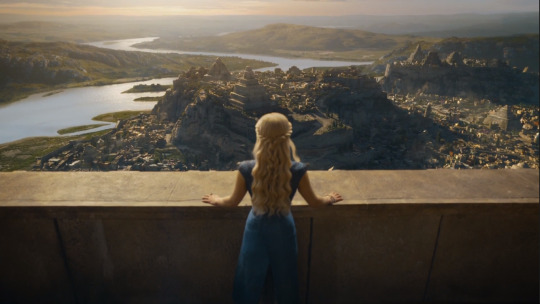
You are a queen, her bear said. In Westeros. “It is such a long way,” she complained. “I was tired, Jorah. I was weary of war. I wanted to rest, to laugh, to plant trees and see them grow. I am only a young girl.”
This is not a Dany the show allows us to observe. The Daenerys Targaryen of the show is not allowed to be vulnerable or uncertain or crumble. She’s not allowed to question her purpose and path in the world. After all, how can the most powerful character in the show ever falter? This is where the show takes the easy way out of putting more emphasis on the visual extravaganza - dragons burning down ships and Emilia Clarke walking through flames unscathed are easy crowd pleasers. But these are also just surface level considerations of Dany’s power and importance. She isn’t who she is because she has dragons - she has her dragons because she is who she is.
But a major point of contention is - who DOES she need to be? See, Dany has always known she’s ‘important’ - in the way political prisoners are important. In the beginning it’s only her family name which holds her value. Her gradual journey from being only symbolically important as a Targaryen, to owning her own narrative as herself is fraught with considerable internal turmoil. The identity Dany cherishes most is that of Mother. Choosing to free the slaves in Astapor and Yunkai is the first decision she takes as a player with power and resources, and this decision has NOTHING to do with her destiny as a Targaryen. You identify a hero by their choices - and it is in this moment, uninfluenced by magic, or a greater power, this young girl sees the horror in a long established custom and CHOOSES to fight it. I would anyway have been invested as Daenerys as a character - but that one action firmly placed her on a pedestal .
In spite of where her destiny may pull her she wants to retain her softer dreams, her yearning for an uncomplicated happiness. At the same time, she’s voluntarily taken on the burden of ruling in Mereen, despite the responsibility very clearly chaining her. At the end of ADWD, her fevered dreams seem to suggest that both her softness and her duty are pulling her away from her true destiny. Dany’s struggles with self revolve around choosing between her identities as the Dragon, the Mother and the Conqueror - I personally subscribe to the belief that Dany ‘finding herself’ would mean realising that her three identities are not separate, but feed into each other to create the Daenerys Targaryen she is meant to be.
The show puts the cart before the horse and ignores the reverberating impact of a piece of Old Valyria being reborn on the shores of the continent where the empire fell. Her trek through the Dothraki Sea once she escapes on Drogon’s back is such a crucial pivot point in her story - it is literally the point where the old Dany is being left behind for who she will ultimately need to become.
And saw her brother Rhaegar, mounted on a stallion as black as his armor. Fire glimmered red through the narrow eye slit of his helm. "The last dragon," Ser Jorah's voice whispered faintly. "The last, the last." Dany lifted his polished black visor. The face within was her own.
After that, for a long time, there was only the pain, the fire within her, and the whisperings of stars.
She woke to the taste of ashes.
The show does make it clear that Dany’s ultimate destiny lies in Westeros - but the Iron Throne can hardly be it. Why will the last dragon be so singularly focused on a crumbling monarchy? Unjustly attacked and exiled and now fighting to retake their ‘rightful’ place - that’s a traditional fantasy storyline and in a purely monarchical power struggle needs neither Dany’s magic nor her dragons. The Iron Throne is such a low bar - what Daenerys attempted in Slaver’s Bay is ten times more difficult and impressive. As of this point in the books Mereen is on the brink of absolute chaos and the situation is much, much more convoluted than the show made it out to be. The political uprising of Mereen was dealt with so laughably on the show - ‘Bring dragons, Burn shit’ doesn’t solve any problems whatsoever but let’s save that for the next part.
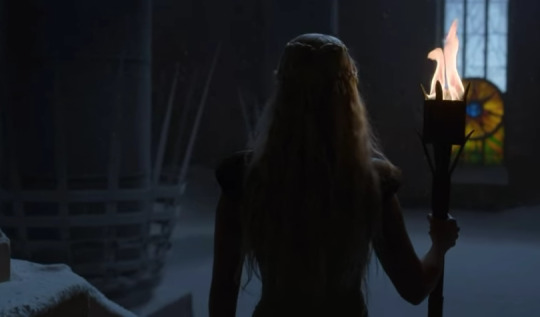
Painting Dany’s journey back to Westeros as simply an exiled royal returning to take back what’s theirs removed the poignancy in Dany looking for home in Westeros. There’s this sense of yearning in her desperately looking for a place to belong in a country that’s little more than a fable to her. She tried SO hard to make a home with the Dothraki and to find a place as the ruler of Mereen - but if there’s one takeaway from ADWD it’s that Dany’s fate doesn’t rest in Essos. I expect WoW to be a bloody reckoning, an agonizing choice between Dany’s duty and destiny. The new world order she’s established is far too new and fragile to sustain itself. As we see from Cleon’s ascent in Astapor, evil opportunists exists everywhere, regardless of societal class. To cement her order, Dany and her inner circle need to stay in Mereen for a lengthy period of time. But Westeros is calling - she has to choose. It’s nowhere near as easy as the three Yunkish Masters being the only figureheads, the Greyjoy siblings traipsing into the pyramids with the ships she needs, and alliances falling into her lap just so that D&D don’t need to put in any effort into creating plot and can simply throw spectacular CGI at us.
My point is - you don’t need a dragon (or three) to fight Cersei Lannister and a court jester on ADHD masquerading as Euron Greyjoy (not Pilou, its obvious the dude read the books and expected great things from his character). You do however need them to fulfil the prophecy passed down generations of Targaryens, beginning from Aegon the Conqueror. You do need the last living embodiment of the magic of Old Valyria to combat the foul, unholy magic wielded by the utterly terrifying Euron Greyjoy of the books. The reason Aegon began his conquest of Westeros is beyond mere ambition - and if we go by what Martin himself revealed about his intentions, the Others ARE the final War. We had only 2 episodes in S7 to show Daenerys understanding the gravity of the Night King (godawful mission beyond the Wall and polar bear wights aside) - and then arrives the wrecking ball of S8 with its ‘Northern Independence’ and ‘my Iron Throne’.
The trouble with legendary heroes is this - they save the world for everyone else. Dany defeats all other claimants to the Throne and takes back Dragonstone, King’s Landing and the Seven Kingdoms, as Viserys wanted, and she believes her duty to be. She and Jon lead the Last Alliance against the Great Other. Maybe they win and live happily ever after. Maybe they win, but only after losing everything they hold dear. And maybe they win, and only lose part of themselves. Does that end Dany’s story? Is a Kingdom and a reign what she’s been searching for? Dany’s story only ends when she finds herself in front of that red door again.
Jon
It’s an infuriating irony that despite portraying him as MUCH softer than in the books, Jon’s vulnerability is either non-existent in the show, or is turned into a weakness. Where does the show ever dwell on his deep seated issues with identity, duty and survivor’s guilt? Where does the show address the raw power of his love for Arya? And why does the show think that the progression of Hardhome, being fucking murdered AND resurrected, and then Rickon’s death in front of his eyes would NOT leave a lasting mental impact?
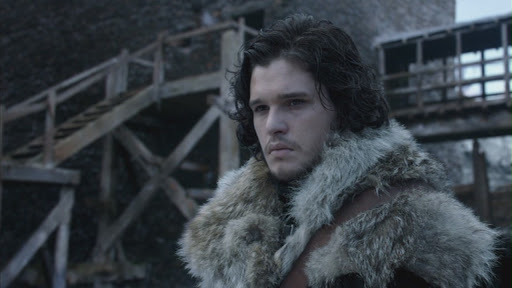
To its’ credit, the show did clearly indicate Catelyn’s hatred for Jon. What we didn’t see, and thus don’t have a ready reference for (in the show) is how Catelyn’s treatment affected Jon. In the books though, you can clearly suss out the emotional impact of the years of Jon’s childhood.
He reached the landing and stood for a long moment, afraid. Ghost nuzzled at his hand. He took courage from that. He straightened, and entered the room.
He stood in the door for a moment, afraid to speak, afraid to come closer. The window was open. Below, a wolf howled. Ghost heard and lifted his head.
This is at Bran’s bedside when he’s still deep in a coma, with no certainty of whether he will ever wake again. Jon’s leaving for the NW, and this may very well be the last time he ever sees Bran again. Jon loves his little brother with everything he has, yet the overbearing emotion at this moment is his fear of Catelyn Stark.
Keep in mind that every POV hides something or the other from the reader. Thoughts and feelings may seem disjointed as a critical memory which aligns the two is missing. In this case, Jon is actively NOT thinking of any particular incident. Yet his fear is all pervasive. It’s an uncovered wound and it hurts him. We may not know exactly what has happened between Jon and Catelyn in the 14 years leading up to this moment, but Jon’s fear of her is very real. This almost paralyzing fear of Catelyn placed against the overbearing love he feels for Bran at this moment makes this exchange stand out for several reasons, chief amongst which is that Catelyn has left an indelible mark on Jon’s psyche.
Robb and Bran and Rickon were his father’s sons, and he loved them still, yet Jon knew that he had never truly been one of them. Catelyn Stark had seen to that.
By the time the moon was full again, he would be back in Winterfell with his brothers. Your half-brothers, a voice inside reminded him. And Lady Stark, who will not welcome you. There was no place for him in Winterfell, no place in King’s Landing either.
The fear lessens once he leaves the halls of Winterfell, and bitterness takes its place. Jon’s feelings about her are tinged with fury and resentment. He’s long past hoping for affection from her, but what still rankles and will never stop being a source of anger, is that she deliberately tried to sabotage his relationships with others who most definitely were his family.
Jon’s thoughts make it obvious that he is painfully aware that he doesn’t belong. For an awareness this heavy to be so deeply etched into a young boy’s entire being, the message has to have been reinforced intensely over the entire duration of his life in Winterfell. That’s not compatible with the assumption that Catelyn was only cold and dismissive of him. We don’t see the instances in either Jon’s or Catelyn’s viewpoints in the books, but the inference is all but thrown at us.

Jon’s growth as a person, a leader and a revolutionary is dependent on his time with the NW just as much as his time with the FF. The show cut out far too many important aspects of his time with the FF, but atleast that part of his journey was treated with more respect than his accomplishments as a man of the NW. (Let me not start on the absolute blasphemy to turn one of the most decisive characters in the entire saga into a dithering, uncertain, meek fool in S8.)
Unlike Dany, Jon has never been important. He has no name, no legacy to uphold, no shoes to step into. All he has are his natural abilities - his startlingly accurate powers of perception for someone so young, his capacity for taking feedback to change for the better and his razor sharp practical intelligence. The text seems to suggest that Jon was indirectly forced to downplay his abilities due to his status - besting Robb was just not done.
With her deep blue eyes and hard cold mouth, she looked a bit like Stannis. Iron, he thought, but brittle. She was looking at him the way she used to look at him at Winterfell, whenever he had bested Robb at swords or sums or most anything. Who are you? that look had always seemed to say. This is not your place. Why are you here?
It’s at the Night’s Watch that Jon first starts to become someone more than Ned Stark’s bastard - in his OWN estimation. The world will continue to see only a bastard and Ned Stark’s shame, but its here that Jon learns to accept and move beyond it. It’s in the yard of the NW training yard that Jon receives his first harsh lesson about himself - he’s lording the privilege of his castle education over boys far less fortunate than him. It’s at the NW that he has the opportunity to use his abilities. It’s here that Jon finds his calling as the champion of the misfits, the ill-begotten, the unwanted and the reviled. He becomes the de-facto trainer of the boys Alliser Thorne deems beneath his dignity. He’s the one convincing Maester Aemon of Sam’s worth as his squire. And it’s at the NW that Jon first begins forming his opinion of the wars of the south - something which he will carry till the end.
When dead men come hunting in the night, do you think it matters who sits the Iron Throne?
The staggering impact of his experience in the NW to his character is an essay in itself. For the purposes of this post, suffice to say that without the NW Jon would never have grown to the position to have an impact on the greater story. As of ADWD, the Wall under Jon’s leadership has become somewhat of a rallying ground - hosting a King, a highborn Northern lady looking for deliverance and support, as well as the center for revitalizing the Watch, rebuilding the Wall and rekindling hope in the North.
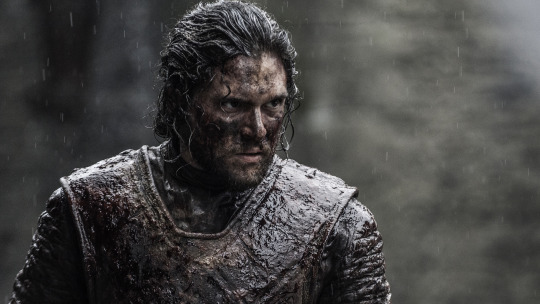
At some point after his resurrection in the show, Jon’s portrayal starts edging over into the ‘noble, sacrificial hero’ archetype. This wouldn’t necessarily have been a BAD thing – if this ‘goodness’ and ‘nobility’ didn’t come at the expense of Jon’s overall characterization.
His ‘goodness’ comes in the form of forgiving Sansa for keeping the Vale army secret and keeping her as his closest confidant. This so-called goodness of heart is rank naivete the sharply perceptive and observant book!Jon would have been stupefied at. Jon knows to judge people by their actions – and Sansa’s actions made it obvious that she’s playing her own game and considers her brothers’ lives expendable collateral. The Jon who understood the heaviness of the mantle of leadership well enough to cultivate distance from even his closest friends in the NW would NEVER have allowed Sansa so close.
The ‘honourable’ show!Jon allows his Lords and his sister to question and challenge him openly. The ‘noble’ King Jon has to explain himself before undertaking a journey to gain a potential ally - the only possible ally against a War the North seems unwilling to believe despite the reports of the dead having been around since S1. The honest son of Ned Stark cannot lie to his House’s greatest living enemy. Lord Commander Jon would sooner have jumped off from the top of the Wall than take these decisions. He’s aware of the nature of power and authority, and that more than holding a position its important to make those around you believe you hold power. Power can do great good - but it is also fickle.
Despite the NK and the AoTD being turned into a cosmic farce in the last season, the show did quite a good job of building up the horror, menace and sense of doom in the previous seasons. Hardhome is prime example of why the show was once the pinnacle of television – and what Jon saw there, coupled with the utter failure of his mission to evacuate all the FF would have pushed Jon to the brink of insanity anyway. From what we know of Jon, he carries the deaths of his father, Robb, Bran, Rickon and Winterfell close to him. Compound the steadily growing pressure of that loss with the fact that he loses Grenn, Pyp and Ygritte in the same night. Three of the people most important to Jon but a loss he was never given the time to process as Stannis’s army arrives the very next day. He’s still carrying this heaviness when Hardhome happens, and Jon is exactly the kind of man to blame himself for the people he was unable to evacuate. Not to mention, this is the first time he sees the Night King RAISE the dead – this is the point where the true power of the enemy is fully revealed. That was existential horror at its most visceral and not a sight a man is likely to forget, least of all a man who’s trying his best to create the only resistance.
Let’s forego the changed circumstances of Jon’s murder in the show and consider the act as is – Jon does the right thing, knows he’s doing the right thing and is betrayed and murdered for it. He’s dead and then he’s not and while he’s still struggling with resurrection, betrayal and the memories of Hardhome, Sansa arrives and he’s in the middle of the quest to retake Winterfell. It’s traumatic experience upon traumatic experience, a never-ending series of emotional turmoil with no outlet or time to grieve. This is the only reason I see Jon’s actions at the Battle of Bastards being true to his mental condition in the show – having Rickon die right in front of him when his little brother was pretty much the only reason he was able to gather the mental strength for the campaign would have unhinged him to the point of that ridiculously suicidal move.
But see that’s the last time we see any strong emotion from Jon. He seemed mentally and emotionally exhausted in the Winds of Winter episode, and that’s understandable but only at THAT point. That kind of exhaustion sets in only once you’re done with your battles and Jon’s true battle was just beginning. It’s just never acknowledged – when in truth he would barely have a handle on his temper and would be obsessed with the NK to the point of delirium. We apparently can’t have a functional main hero with his emotions all over the place, gathering the strength to do what must be done while falling apart inside. Or if we DO show him as someone struggling with himself, it’s to paint him as someone too weak to see the truth. Someone too blinded by love who should never have been in charge in the first place.
Heroes are strong, brave, just and honourable. They are powerful and commanding and inspiring. And at the very core of it all, heroes are human. Wish the show had remembered that.
150 notes
·
View notes